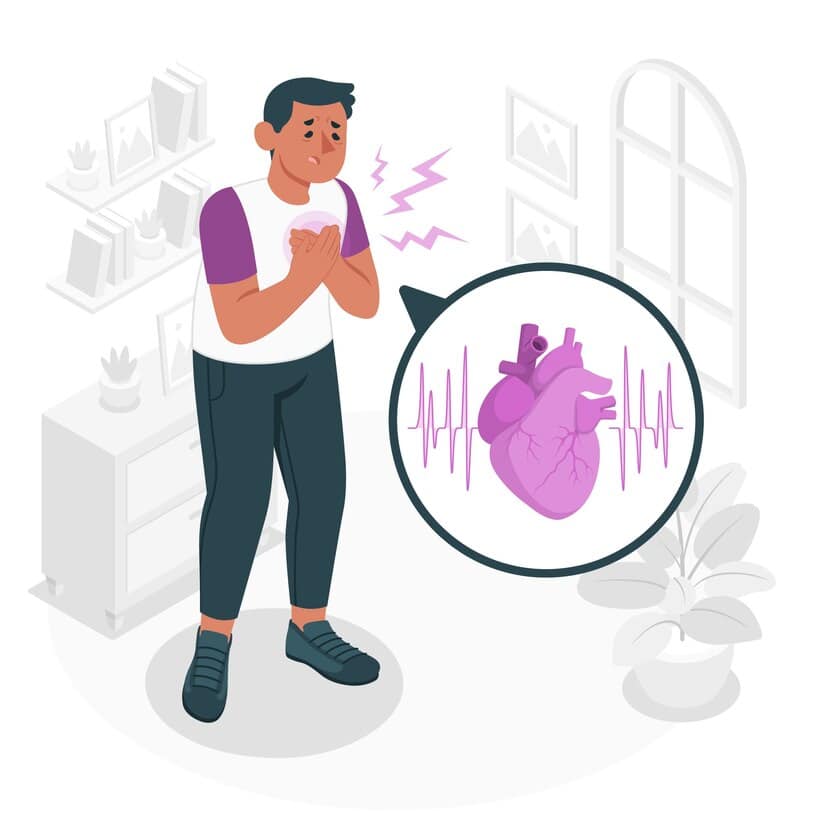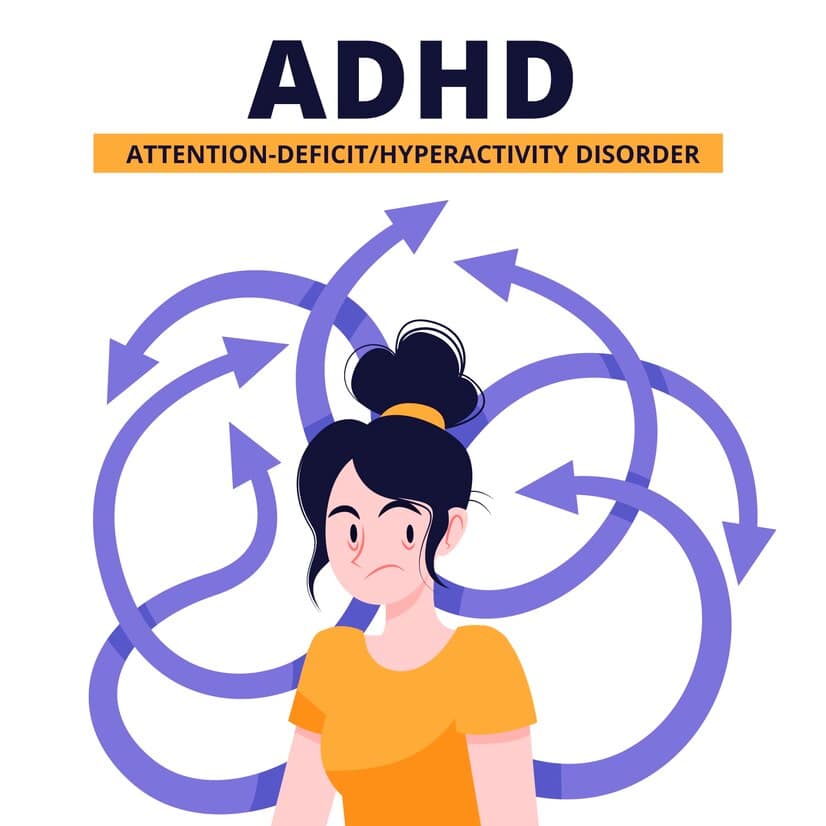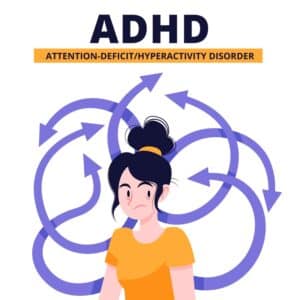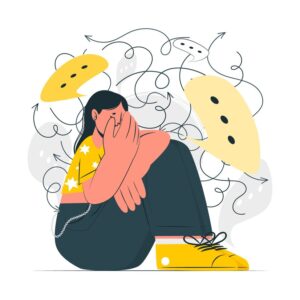Key Takeaways
- Cognitive Behavioral Therapy (CBT) is highly effective in addressing the behavioral aspects of ADHD.
- Combining medication with therapy also is a comprehensive approach to managing ADHD symptoms.
- Lifestyle changes – including exercise and mindfulness – can enhance ADHD treatment effectiveness and improve overall well-being.
- A Mission for Michael (AMFM) is a dedicated mental health treatment provider for adults with ADHD – with facilities located in California, Washington, and Virginia.
Importance of ADHD Treatment
Attention Deficit Hyperactivity Disorder (ADHD) in adults manifests in various ways, such as difficulty focusing, impulsivity, and hyperactivity. Treating ADHD in adults is important because:
- Untreated ADHD can cause problems in relationships and job performance.
- Untreated ADHD increases the risk of developing anxiety and depression.
Therefore, understanding and choosing the right treatment for ADHD can help manage symptoms, improve focus, and enhance overall functioning in daily life.
ADHD treatment usually involves a combination of medication, therapy, lifestyle adjustments, and holistic practices.
| A Mission For Michael: Expert Mental Health Care Founded in 2010, A Mission For Michael (AMFM) offers specialized mental health care across Southern California, Washington, and Virginia. Our accredited facilities provide residential and outpatient programs, utilizing evidence-based therapies such as CBT, DBT, and EMDR. Our dedicated team of licensed professionals ensures every client receives the best care possible, supported by accreditations from The Joint Commission and the California Department of Health Care Services. We are committed to safety and personalized treatment plans. Start your recovery journey with AMFM today! |
Medication Management for ADHD
Medication is often the first step in treating ADHD in adults because it can quickly reduce symptoms and improve focus and concentration. There are two main categories of medications used for ADHD: stimulants and non-stimulants.
Stimulant Medications
Stimulant medications are the most commonly prescribed for ADHD. They work by increasing the levels of certain neurotransmitters (i.e. dopamine and norepinephrine) in the brain, to improve attention and reduce impulsivity. Common stimulant medications include:
- Adderall: This medication is often prescribed for its quick and effective results.
- Ritalin: Another popular stimulant, Ritalin, can enhance focus and attention.
While stimulants are highly effective for many individuals, they can also have side effects – such as increased heart rate and insomnia. Always work closely with a certified and experienced healthcare provider to monitor these effects and adjust the dosage as needed.

Non-Stimulant Medications
Non-stimulant medications are an alternative for those who cannot tolerate stimulants. These medications generally take longer to show effects but can be just as effective.
A common non-stimulant medication is:
- Strattera: This medication increases norepinephrine levels in the brain by inhibiting its reuptake – thus improving attention and focus in individuals with ADHD.
Non-stimulant medications are often preferred for individuals with co-existing anxiety disorders, as they tend to have a calming effect.
Addressing Side Effects
Medication side effects are a common concern for many individuals with ADHD. The common side effects are:
- Insomnia
- Loss of appetite
- Increased heart rate
These side effects must be addressed quickly by a healthcare provider to ensure the treatment remains effective and tolerable.
Therapeutic Interventions
Cognitive Behavioral Therapy (CBT)
Cognitive Behavioral Therapy (CBT) is an effective, evidence-based therapy for ADHD. By identifying and challenging negative thought patterns, individuals can develop healthier perspectives and manage their ADHD symptoms better.
CBT may involve role-playing and homework assignments so that individuals can practice new skills in real-world scenarios. This hands-on approach helps reinforce learning and promotes long-term change.
Executive Functioning Coaching
Executive functioning coaching helps individuals with ADHD improve planning, organization, and time management. ADHD coaches provide personalized strategies to handle challenges in school, work, and daily life. Through one-on-one sessions, the coaches assist with goal setting, task breakdown, and creating effective systems – helping individuals stay focused and meet deadlines.
For example, someone struggling with time management might receive help in learning to use a planner effectively, setting reminders for important tasks. Over time, these strategies become habits, which help the individuals be more productive and handle stress better.

Psychodynamic Therapy
Psychodynamic therapy for ADHD is about uncovering unconscious thoughts and emotions that may influence symptoms. Unlike behavioral therapies, it addresses deeper issues to help individuals understand behavior patterns.
While not a primary treatment, it complements other therapies by addressing the emotional aspects of managing ADHD.
Holistic Approaches
Holistic therapies include natural healing methods that address the mind-body-spirit connection. When combined with the traditional treatments listed above, they can further enhance the management of ADHD symptoms.
Mindfulness and Meditation
Mindfulness and meditation practices encourage individuals to be more aware of the present moment, and help improve focus and attention. Practicing mindfulness exercises, such as deep breathing or guided meditation, can reduce stress and promote a sense of calm.
Incorporating mindfulness into daily routines can be as simple as taking a few moments each day to focus on one’s breath or engaging in a short meditation session.
Nutrition Therapy
Consuming a balanced diet rich in essential nutrients can support brain function and improve focus. Incorporate whole foods, such as fruits, vegetables, lean proteins, and whole grains, into meals.
Also limit the intake of processed foods and sugar, as these can worsen ADHD symptoms. Certain nutrients, such as omega-3 fatty acids found in fish, have been shown to support cognitive function and may be beneficial for individuals with ADHD.
Exercise Therapy
Regular exercise (e.g. running, swimming, or cycling) improves focus and mood, while also reducing impulsivity and hyperactivity by releasing pent-up energy.
It also increases neurotransmitters like endorphins, serotonin, and dopamine – which are important for improving attention and motivation.
Lifestyle Adjustments
Time Management Techniques
Prioritizing tasks and allocating time efficiently can reduce stress and increase productivity. Consider the following time management techniques:
- Create a daily schedule with all tasks and appointments using a planner or digital calendar.
- Break tasks into smaller steps to avoid feeling overwhelmed.
- Set specific goals for each task to stay on track.
- Use timers to focus on one task at a time.
- Schedule regular breaks to prevent burnout.
Organization Strategies
Staying organized is another challenge for individuals with ADHD. Consider implementing these organization strategies:
- Designate specific places for commonly used items.
- Use color-coded folders or labels to categorize documents.
- Regularly declutter and organize your workspace.
Monitoring and Adjustments
Regular check-ins with a healthcare provider are recommended for reviewing symptoms, assessing medication effectiveness, and addressing any concerns or side effects.
As symptoms or circumstances change, treatment plans may need updates – such as adjusting medication dosages, adding new therapies, or making lifestyle changes to maintain effectiveness.
For example, if an individual experiences increased stress due to work demands, the healthcare provider may suggest incorporating mindfulness practices or adjusting their medication schedule to better manage ADHD symptoms.

Managing ADHD with A Mission for Michael
ADHD can disrupt your daily life, making focus and organization feel out of reach.
At A Mission for Michael (AMFM), we provide specialized care for adults with ADHD – especially when it’s paired with other mental health challenges like anxiety or trauma.
Our comprehensive treatment approach blends evidence-based therapies with holistic strategies – ensuring care is personalized for your mental health needs.
With a low client-to-staff ratio (just 6-8 clients per home), you’ll receive the attention and support necessary to build lasting skills for focus and balance.
We have locations in California, Virginia, and Washington, so help is closer than you think. Take the first step toward clarity and confidence – reach out today.
Start your recovery journey with AMFM today.
Frequently Asked Questions (FAQ)
What is the first-line treatment for adult ADHD?
The first-line treatment for adult ADHD usually consists of stimulant medications, such as Adderall or Ritalin. These medications are effective in reducing symptoms and improving focus and attention. However, treatment plans should be individualized, and non-stimulant options may be used based on the individual’s needs and medical history.
Can therapy alone help manage ADHD symptoms?
Therapy alone can help manage ADHD symptoms – particularly when combined with lifestyle changes. Behavioral therapies, such as CBT, can help individuals develop effective ADHD coping strategies and improve organizational skills.
What is A Mission for Michael?
A Mission for Michael (AMFM) is a mental health treatment center that helps adults with ADHD achieve improved symptom management and enhanced quality of life with its evidence-based holistic therapies.








